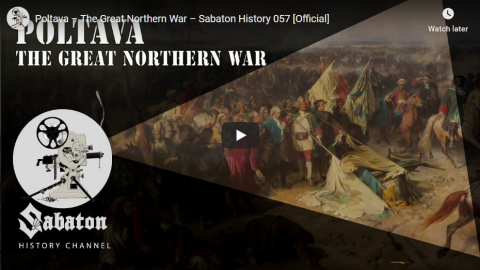Sabaton History
Published 5 Mar 2020Bullets break the silent air, a wasted battleplan! It was a long and harsh march through the lands in the east, where the Swedish army of Charles XII sought to bring the Russian Empire to its knees. The Swedish king had the vision of a great victory, in which he captured Moscow and destroyed Tsar Peter I’s ambitions once and for all. However, as in late June 1709, the exhausted and hungry Swedish troops finally met the Tsar in open battle near the fortress of Poltava, it all seemed impossible. A relentless and fateful battle would commence. A battle after which only one empire would continue to rise while the other would fall.
Support Sabaton History on Patreon: https://www.patreon.com/sabatonhistory
Listen to “Poltava” on the Album Carolus Rex:
CD: http://bit.ly/CarolusRexStore
Spotify: http://bit.ly/CarolusRexSpotify
Apple Music: http://bit.ly/CarolusRexAppleMusic
iTunes: http://bit.ly/CarolusRexiTunes
Amazon: http://bit.ly/CarolusRexAmz
Google Play: http://bit.ly/CarolusRexGooglePlayCheck out the trailer for Sabaton’s new album The Great War right here: https://www.youtube.com/watch?v=HCZP1…
Listen to Sabaton on Spotify: http://smarturl.it/SabatonSpotify
Official Sabaton Merchandise Shop: http://bit.ly/SabatonOfficialShopHosted by: Indy Neidell
Written by: Markus Linke and Indy Neidell
Directed by: Astrid Deinhard and Wieke Kapteijns
Produced by: Pär Sundström, Astrid Deinhard and Spartacus Olsson
Creative Producer: Joram Appel
Executive Producers: Pär Sundström, Joakim Broden, Tomas Sunmo, Indy Neidell, Astrid Deinhard, and Spartacus Olsson
Post-Production Director: Wieke Kapteijns
Edited by: Iryna Dulka
Sound Editing by: Marek Kaminski
Maps by: Eastory – https://www.youtube.com/c/eastoryArchive by: Reuters/Screenocean https://www.screenocean.com
Music by Sabaton.An OnLion Entertainment GmbH and Raging Beaver Publishing AB co-Production.
© Raging Beaver Publishing AB, 2019 – all rights reserved.
From the comments:
Sabaton History
2 hours ago
Just a quick correction: St. Petersburg was not named after Peter I himself, but after his patron saint St. Peter. Although the Russian Tsar made sure that he himself would be immortalized by founding St. Petersburg, Russia’s window to Europe.




